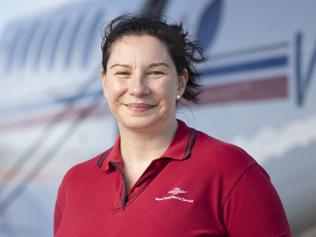Critical care
Where would Queenslanders be without the RFDS? We asked the organisation’s Brisbane Ops Base manager Justine Powell.

Where would Queenslanders be without the RFDS? We asked the organisation’s Brisbane Ops Base manager Justine Powell.
When you are in charge of an organisation that is often the difference between life and death for thousands of people across Queensland, you collect some interesting stories. Asked to recount some that stick in her memory, the Royal Flying Doctor Service’s operations manager at its Brisbane base, Justine Powell, immediately thinks of a woman bitten by a deadly brown snake near Monto, west of Bundaberg.
“Certain snake bites are time-critical events,” Ms Powell says.
“And when there is a huge storm between you and the patient, this is where the skills and dedication of our pilots come to the fore. Navigating around the storm in turbulence, we got that patient safely back to Brisbane where she received 10 vials of antivenom - and survived.”
Ms Powell, 48, has worked for the RFDS for 18 years, helping people get through many potentially life-changing events.
“Weather events always make our job more challenging,” she says. “Cyclones, floods, and dust storms all impact on aviation. Throw a critically ill patient into the mix and your day becomes complicated.
“And, as a midwife, transferring women in premature labour to the safety of hospital in Brisbane knowing that when that baby is born they will have the best care available … that is the best feeling.”
Ms Powell sometimes stops to reflect on what would happen if RFDS did not exist. She has no doubt that without the organisation, access to healthcare would be compromised as patients and their families would be faced with the prospect of long road trips with Queensland Ambulance Service or in their own cars. Local resources would be depleted and there would be consequences for patients who would be slower to present to hospital.
“If an accident happened remotely or a child was sick in a small rural facility , instead of a two-hour flight with RFDS to definitive care in Brisbane, the eight-hour car ride to the Queensland Children's Hospital would be a very stressful alternative,” she says.
“There’s also the support we provide to smaller remote hospitals or clinics. In many small towns, there is a single nurse looking after a community and we are an important part of the nurse's support network.”
Now Manager Clinical and Base Operations of RFDS Brisbane Base, Ms Powell joined the RFDS in 2001.
“For me this is a dream job, combining my passions, providing high-quality nursing care in the air. I first encountered RFDS at the visitors centre in Alice Springs as a 19-year-old Pommie backpacker. I returned to the UK to commence my nursing degree and then my midwifery degree.
“The RFDS was always a goal of mine and in 2001 my dream came true when I started as a flight nurse reliever at RFDS Rockhampton.”
Last year alone, RFDS Brisbane Base at Brisbane Airport received 3959 patients from 68 Queensland communities destined for specialist care in the city’s hospitals.
“We average eight patients a day coming into Brisbane on RFDS aircraft and four patients a day going back home,” Ms Powellsays. “In Brisbane we have three aircraft - two B350 King Airs and a B200 King Air - and last year they flew 1,489,661km and made 3904 landings, 1406 of those into Brisbane.
“The operational team consists of 12 pilots, 22 flight nurses, five engineers and two support staff. On our busiest day of the week, Saturday, we can have up to seven different RFDS aircraft on the
Brisbane apron as aircraft from Bundaberg, Rockhampton, Townsville and Charleville join
our Brisbane aircraft in delivering patients safely to Brisbane for life-saving treatment.”
Key to making everything run smoothly is the Flying Doctor’s relationship with the Brisbane Airport Corporation.
“That relationship is integral to RFDS Brisbane,” Ms Powell says. “We liaise with BAC on a weekly basis regarding anything that impacts on our partnership, from the ever-changing environment of the Brisbane Airport as we move towards the opening of the third runway, to relocating our aircraft from the other bases in times of disaster.
“Our aircraft are given priority to land at busy times when transferring a time critical patient.”
She says BAC also provides practical support for the maintenance of the base building, such as checking fire alarms and maintaining backup generators. It also donates more $300,000 a year to the RFDS.
“BAC has been a staunch supporter of the RFDS for the past 20 years,” Ms Powell says.
“We provide a 24/7 service, 365 days a year which is vital to all Queenslanders; the same as BAC. I think that is why our relationship works so well. We are both focused on providing the best access for rural and remote communities as well as visitors to our great state.”
Learn more about the Royal Flying Doctors Service here
Originally published as Critical care


